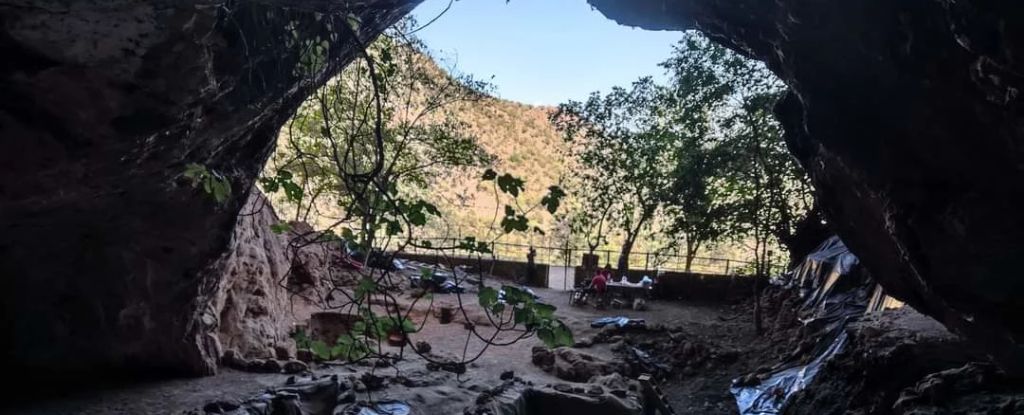Anthropology
Related: About this forumNot All Paleolithic Hunter-Gatherers Were Big Into Meat, New Study Reveals
30 April 2024
By MICHELLE STARR

The view from inside Taforalt cave in Morocco. (Abdeljalil Bouzouggar)
Anyone indulging in a paleo-style diet might want to think about adding a few more vegetables.
The teeth and bones of pre-agricultural human hunter-gatherers who lived some 15,000 years ago in what is now Morocco reveal that their diet – long thought to have been significantly loaded with animal protein – was actually weighted much further in the direction of plant-based food. It seems plants may have even been used to wean infants, the study found.
"Our results unequivocally demonstrate a substantial plant-based component in the diets of these hunter-gatherers," write a team led by anthropologist Zineb Moubtahij of the Max Planck Institute for Evolutionary Anthropology in Germany.
"This study underscores the importance of investigating dietary practices during the transition to agriculture and provides insights into the complexities of human subsistence strategies across different regions."
It's assumed that before the rise of agriculture, ancient humans ate a lot of meat and animal products.
We know they ate some; archaeological sites have been found littered with animal remains that bear evidence of being processed for consumption. Since plant matter is less likely to remain intact through the millennia, it's less clear how much of the diet of ancient humans and their relatives consisted of roots, fruits, stems, flowers, and leaves.
More:
https://www.sciencealert.com/not-all-paleolithic-hunter-gatherers-were-big-into-meat-new-study-reveals
Judi Lynn
(164,049 posts)Counter to traditional ideas about how agriculture started, they never grew the plants they ate
By Jude Coleman
20 HOURS AGO
Unlike many of their mostly meat-eating peers, a group of late Stone Age hunter-gatherers living in what is now northeastern Morocco had a largely plant-based diet. But despite dining for millennia on local, wild plants — such as acorns, pistachios and wild oats, the Iberomaurusians never started cultivating those plants. The finding aligns with recent challenges to scientists’ theory that heavy reliance on plants ultimately leads to their domestication (SN: 11/9/21).
Before humans figured out farming, they relied on hunting and gathering to sustain themselves, with most protein coming from animals. Over time, they shifted from foraging to cultivating certain plants, eventually leading to the plants’ domestication — so goes the typical story of agriculture’s emergence. Archaeologists once assumed that the Iberomaurusians also relied mostly on animals. But data from human remains at a site in Morocco points to a predominantly plant-based diet, researchers report April 29 in Nature Ecology & Evolution.
The site — called Taforalt, which is located in a cave — is a “very important site to study human evolution and understand human behavior during this time,” says Zineb Moubtahij, an archaeologist at Géosciences Environment Toulouse, a research laboratory in France. The Iberomaurusians lived around this area for a long time, starting around 23,000 years ago. They used part of the cave to bury the deceased.
To learn about the Iberomaurusians’ diets, Moubtahij and colleagues turned to teeth and bones from these remains, which date to between 15,077 and 13,892 years old. The team looked at levels of certain forms, or isotopes, of elements — including zinc, carbon and nitrogen — that were deposited from food into tissues and bones. The researchers also looked at isotopes in the remains of herbivores and carnivores from the site, such as sheep and foxes, and compared those to the human isotope levels.
More:
https://www.sciencenews.org/article/stone-age-humans-gatherer-hunter
get the red out
(13,958 posts)People simply adapted to what their environment provided. They didn't have the internet to tell them the latest fad diet that they simply HAD TO follow.